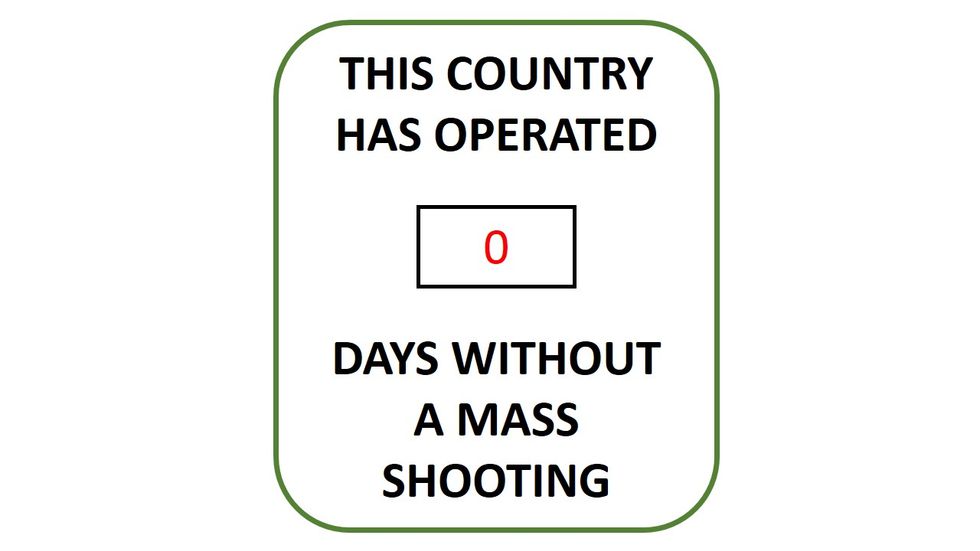While the article The Tenuous Connections Involving Mass Shooting, Mental Illness, And Gun Laws suggests reasons why many Americans feel that the supposed increase in mass shootings would be tempered by a strengthened approach to treating mental health problems, it should be said that while having better treatment for mental health care may not have a direct impact on mass shootings, it would still be beneficial to improve the mental health care system because it proves to be an imperfect yet still essential tool in identifying and recognizing the warning signs of potential public mass shooters.
The article’s assertion that most people with severe mental illnesses that involve debilitating features such as delusions, hallucinations, etc. would not possess the organization skills or the patience to execute mass shootings certainly has merit. Such people usually commit their crimes in a very frenzied and unpredictable manner, often due to the severity of their psychosis (especially if they are out of touch with reality), and the strength of their delusion. The problem is that when we use the term “mentally ill”, it is a very broad range between those who are out of touch with reality and those who have issues such conduct disorder but still function relatively well. We must distinguish between those who are mentally ill and the subset of mentally ill people who have documented conduct disorders and behavioral issues. For example, I would be less concerned about a paranoid schizophrenic committing a mass shooting than I would be about people such as Eric Harris and Dennis Klebold, who I would classify as injustice collectors. Both would be categorized as mentally ill to some extent, even if it was as broad as a personality disorder.
Another example for the varying degrees of mental illness would be the Virginia Tech massacre. In the aftermath of the Virginia Tech shootings in 2007 we learned a great deal about the perpetrator and how disturbed he was. What troubled me the most, however, was the long history of behavioral and mental issues that were documented long before he carried out this attack. While it is true, no one could have predicted that he would commit a mass shooting, in my opinion it almost certainly could have been predicted that he would have some sort of psychotic break. The perpetrator, Seung-Hui Cho, showed every sign of becoming unhinged and the university was aware of it, since as far back as two years before he committed the shooting he’d had a psychiatric evaluation that concluded that he was “mentally ill and in need of hospitalization”, along with multiple reports of behavioral issues and complaints from professors about disturbing writings and also several stalking incidents. His behavior showed a need for concern from a young age, with his family voicing their apprehension in his early childhood. Cho even wrote about wishing to repeat the Columbine High School massacre when he was in eighth grade, shortly after it made international news. There was history of him being bullied in high school as well, and by the time he enrolled in Virginia Tech, it was difficult to overlook the unease regarding his conduct. While I accept that hindsight is 20/20 when addressing incidents such as this, and that few would predict that he would have committed an act as drastic as shooting 32 people, I do assert that a stronger mental health system (and a more aggressive one) would have been able to institutionalize him long before his rampage. In this case, the mental health system did document the warning signs, and the university was aware of it, but neither were unable to take decisive action against him. In this way, having more targeted and rigorous treatment for mental health care may have been an invaluable safety net if it had existed. If Cho had been a paranoid schizophrenic, he arguably would have had a more difficult time acquiring all those firearms. But he was still mentally ill, just not out of touch with reality like many people stereotypically jump to when regarding mental illness. While Cho was not paranoid or delusional, he still had anxiety disorder and major depressive disorder, along with selective mutism, recognized mental illnesses which many would agree had at least some hand in crimes he committed.
It must also be said that the media does have a bias when reporting mass shootings, especially with regards to which angles they choose to focus on and analyze. The stereotypes are such that if the perpetrator of a mass shooting is Caucasian, they have mental health issues. If they are African American, it is gang or drug related. If they are Muslim, there is a connection to terrorism. For this reason, each mass shooting instigates a different debate. The San Bernardino shootings gave fuel to the anti-immigration/refugee and anti-Muslim debate, while the Sandy Hook massacre kept the focus on treatment of mental illness. The various angles that the media choose to cover after mass shootings have a significant impact on which factor concerns most Americans when tackling the issue of mass shootings. There are arguments for every factor being the most pressing, whether it is gun control, terrorism, mental illness, or drugs and gang violence. The media, however, has failed to be impartial in the wake of each shooting, starting the bias from the first news report. A Muslim mass shooter is not given the luxury of having mental illness, and a Caucasian man cannot be classified as a terrorist because he is not Muslim, which makes people forget that the definition of terrorism is committing such violent acts to instill fear or to further a political agenda; for example, Robert Lewis Dear, Jr., the man who shot up Planned Parenthood in Colorado Springs in November 2015, committed those actions because he was anti-abortion, a political belief which he advocated for in doing the shooting. By definition, it was an act of terrorism, but the media played up the angle of mental illness from the start. The Orlando nightclub shooting, which occurred in June 2016 and surpassed the Virginia Tech massacre as the deadliest shooting by a single gunman in U.S. history, with a death toll of 50 people, had several plausible motives. And yet once the suspect, Omar Mateen, was identified as Muslim, the media immediately zeroed in on his possible connections to ISIS and making the connection that he killed homosexuals supposedly because his religious fanaticism made him believe that they were an “abomination” and “deserved to die for their sins”, as many asserted. It was only after delving more into who he was that we learned that despite his pledging loyalty to ISIS during the shooting, he actually had no connection to the terrorist organization. He was alleged by many people around him to be extremely psychologically unstable and there was evidence that he was a closeted homosexual. Even now, almost 6 months later, it has been classified as a “hate crime/terrorism”, most likely because he was Muslim. There is little doubt that if Mateen had been a Caucasian man, it would have been classified as only a hate crime. Public mass shootings give the media different platforms for various debates, so it is difficult to believe or even rely on the media about anything regarding a public mass shooting in the immediate aftermath. And yet, however biased they may be, they are the only source of information we have in such times.
I absolutely agreed with the author of the article’s assertion that mass shootings are the price that America pays for personal freedom. One of the biggest obstacles with mass shootings in the United States is that the gun laws, compared to other nations, are arguably less regulated and controlled, especially in states where hunting and shooting is a recreational activity, and the laws for firearms vary in stringency from state to state. Access to firearms is certainly a factor in mass shootings, whether they are drug or gang-related, family annihilators, or the perpetrator indiscriminately opens fire in a public space. Nations such as Australia have seen the benefits of restricting gun laws after the 1996 massacre at Port Arthur, which left 35 people dead, and since restricting the laws there has yet to be a mass shooting in the 20 years since that incident. This was perhaps easier for Australia to do, since they did not have the Second Amendment that prevents the United States from taking the forceful action that it needs to with regards to gun control, which has many fervent supporters. For pro-gun activists, the right to carry a firearm is as sacred as the privileged conversation between a priest and supplicant (which cannot be violated). This type of freedom comes with the casualties of people who are lost to gun violence in general, not just mass shootings. If pro-gun activists and the government are so dedicated to protecting the Second Amendment, then we must all be prepared to pay the price for this liberty. And as for gun-free zones, the argument of pro-gun activists assert that such places become more vulnerable targets, which is not without merit. But when guns are being used to commit violent crimes, I believe that adding more guns would cause an increase in violent crime, as opposed to lowering the body count for victims of gun violence and mass shootings. The argument that “guns don’t kill people, people kill people” supports pro-gun activist’s argument in the sense that mental illness should be the focus instead of gun control, while it has always seemed apparent to me that both issues must be given equal weight.
While the original article confirmed that the mass majority of mass shootings are not committed by people who are mentally ill, I was given the impression (without the article actually stating so implicitly) that a certain amount of the perpetrators of public mass shootings, a subset of mass shootings, may have some sort of psychiatric illness or personality disorder. The problem, of course, is that mental illness is a very broad category, and when attempting to discern between individuals who would be susceptible to commit a mass shooting it would be difficult to come up with a criteria of which type of mental illness is more threatening. For those who say that people with mental illness should be banned from possessing firearms, the same issue arises. A person with paranoid schizophrenia would be banned from buying a gun without any debate, but then do we also deny a person with depression? And what if that person has depression but isn’t diagnosed, and ends up committing a public mass shooting? Do we then also deny anyone with any type of personality disorder? This is a multi layered issue with many obstacles, and many possible solutions, some more valid than others. Personally, I believe that stronger gun control is vital to curbing mass shootings in general, but that more aggressive treatment of mental health would be particularly helpful as a safety net for catching potential public mass shooters. It is not perfect, but whether there has been a rise in mass shootings or not, every effort should be made to take any and all preventative measures against them.
Public mass shootings are what always spark the most debate, because they come across as the most senseless and they give the media a way to spark a debate for each particular angle. For the progress and betterment of our society, it is important that we attempt to curb all mass shootings, but it seems that public mass shootings are arguably the most “preventable” and least “complex”, since other mass shootings involve aspects such as drugs, money, family annihilators, etc. (hence the theme of them being the most “senseless”), so they get the most debates and speculation. The fact of the matter, however, is that while each public mass shooting refuels many of the existing debates, over and over again, little action has actually been taken on any of the fronts. These types of public mass shootings have become a spectacle for all of us, which we lament and grieve over until we become numb to them, waiting to dissect the next one. It is similar to how our families gather at parties and debate the state of the world and political affairs, analyzing and contesting one another, mainly for the sake of argument, for the interest in debating one another rather than actually doing anything. That is what public mass shootings have devolved into, the subjects for our hypothetical arguments and debates. And whatever stance people take on which influences and circumstances are the most pressing in causing public mass shootings, little actual action is being taken to address any of them, meaning that whether the actual number of mass shootings have increased or not, we are still trapped in the same vicious cycle at the end of one mass shooting that will inevitably give way to the next one. The only variable is not if, but when it happens.


















